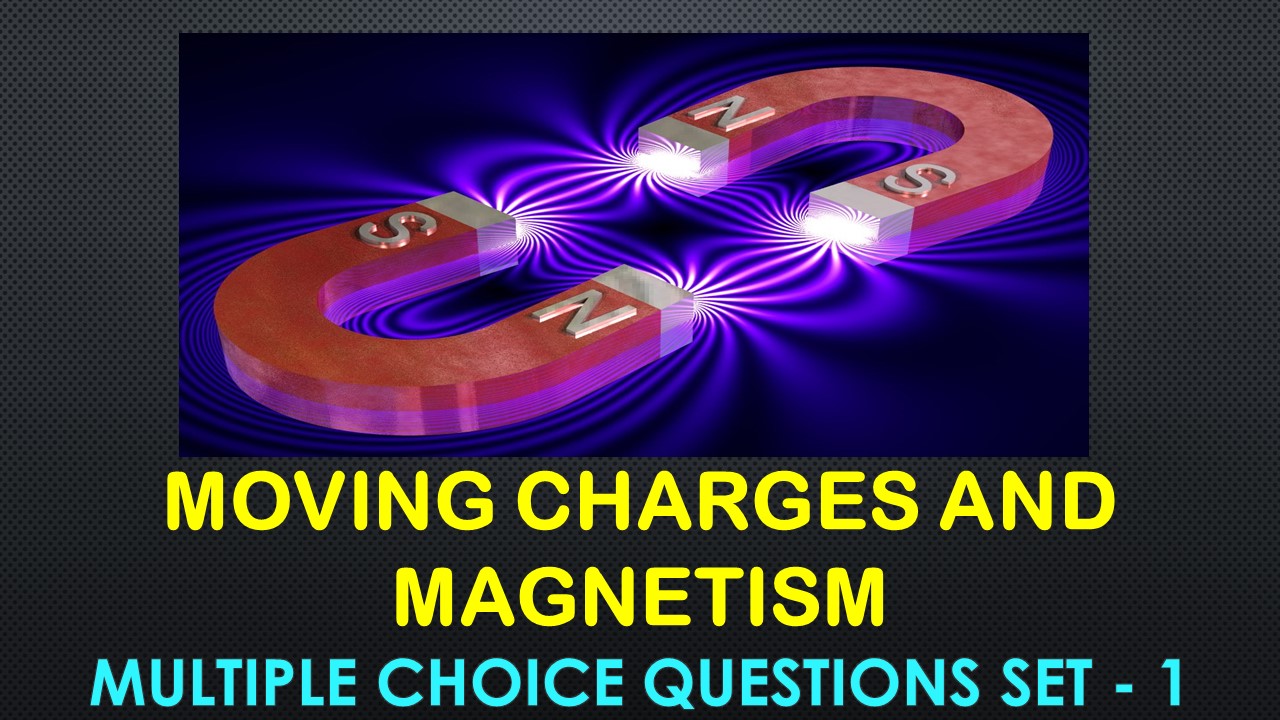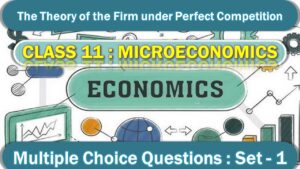CBSE Class 12 Moving Charges and Magnetism Multiple Choice Questions with Answers. MCQ Questions Class 12 Moving Charges and Magnetism with Answers Is Prepared Based on Latest Exam Pattern. Students can solve NCERT Class 12 Moving Charges and Magnetism MCQs with Answers to know their preparation level.
Students who are searching for NCERT MCQ Questions for Class 12 Moving Charges and Magnetism with Answers are compiled here to get good practice on all fundamentals. Know your preparation level on MCQ Questions for Class 12 Moving Charges and Magnetism with Answers. You can also verify your answers from our provided MCQ Class 12 Moving Charges and Magnetism with Answers. So, ace up your preparation with MCQ of Class 12 Physics Examinations.
MCQ Questions Class 12 Moving Charges and Magnetism with Answers - Set - 1
Question 1:
A proton and an electron enter a region in which a magnetic field is suddenly switched on. The forces experienced by them are:
(a) equal and opposite.
(b) different in magnitude but in same direction.
(c) in the ratio of 1840.
(d) same in magnitude and direction.
Correct Answer – (A)
Question 2 :
Magnetic field is not associated with:
(a) a charge in uniform motion.
(b) a decelerated charge.
(c) an accelerated charge.
(d) a stationary change.
Correct Answer – (D)
Question 3 :
(a) π/2
(b) π/4
(c) π
(d) Zero
Correct Answer – (A)
Question 4 :
Two particles A and B having equal charges after being accelerated through the same potential difference enter a region of uniform magnetic field and describe circular path of radii R1 and R2 respectively. The ratio of the masses of A to B is:
(a) (R1/R2)1/2
(b) (R2/R1)
(c) (R1/R2)2
(d) (R1/R2)
Correct Answer – (C)
Question 5 :
A wire is placed parallel to the lines of force in a magnetic field and a current flows in the wire, then:
(a) The wire will experience a force in the direction of the magnetic field.
(b) The wire will experience a force in a direction opposite to the magnetic field.
(c) It will experience a force in a direction perpendicular to the lines of force.
(d) Tire wire will not experience a force at all.
Correct Answer – (D)
MCQ Questions Class 12 Moving Charges and Magnetism with Answers
Question 6 :
A magnetic needle is kept in a non-uniform magnetic field. It experiences:
(a) a force and torque.
(b) a force but not a torque.
(c) a torque but not a force.
(d) neither a force nor a torque.
Correct Answer – (A)
Question 7 :
What happens between the two streams of electrons moving parallel to each other in the same direction:
(a) attract each other
(b) cross the electric and magnetic field of each other.
(c) repel each other.
(d) none of these
Correct Answer – (C)
Question 8 :
When a charged particle moves perpendicular to a uniform magnetic field, its:
(a) Energy and momentum both change.
(b) Energy and momentum both don’t change.
(c) Energy changes but momentum remains unchanged.
(d) Momentum changes but energy remains unchanged.
Correct Answer – (D)
Question 9 :
In order to increase the sensitivity of a moving coil galvanometer,
(a) the suspension wire should be made stiff.
(b) the arc of the coil should be reduced.
(c) the magnetic field should be increased.
(d) the number of turns in the coil should be reduced.
Correct Answer – (A)
Question 10 :
A charge moving with a velocity v in X-direction is subjected to a field of magnetic induction in the negative X direction. As a result, the charge will:
(a) remain undefeated
(b) retard along X-axis
(c) start moving in a circular path in YZ plane.
(d) move along a helical path around X-axis.
Correct Answer – (A)
- NCERT Solutions Class 11 Chemistry Chapter 1 : Some Basic Concepts of Chemistry
- NCERT Solutions Class 11 Chemistry Chapter 2 : Structure Of The Atom
- NCERT Solutions Class 11 Chemistry Chapter 3 : Classification of Elements and Periodicity in Properties
- NCERT Solutions Class 11 Chemistry Chapter 4 : Chemical Bonding and Molecular Structure
- NCERT Solutions Class 11 Chemistry Chapter 5 : States of Matter
- NCERT Solutions Class 11 Chemistry Chapter 6 : Thermodynamics
- NCERT Solutions Class 11 Chemistry Chapter 7 : Equilibrium
- NCERT Solutions Class 11 Chemistry Chapter 8 : Redox Reactions
- NCERT Solutions Class 11 Chemistry Chapter 9 : Hydrogen
- NCERT Solutions Class 11 Chemistry Chapter 10 : The s-Block Elements
- NCERT Solutions Class 11 Chemistry Chapter 11 : The p-Block Elements
- NCERT Solutions Class 11 Chemistry Chapter 12 : Organic Chemistry: Some Basic Principles and Techniques
- NCERT Solutions Class 11 Chemistry Chapter 13 : Hydrocarbons
- NCERT Solutions Class 11 Chemistry Chapter 14 : Environmental Chemistry




